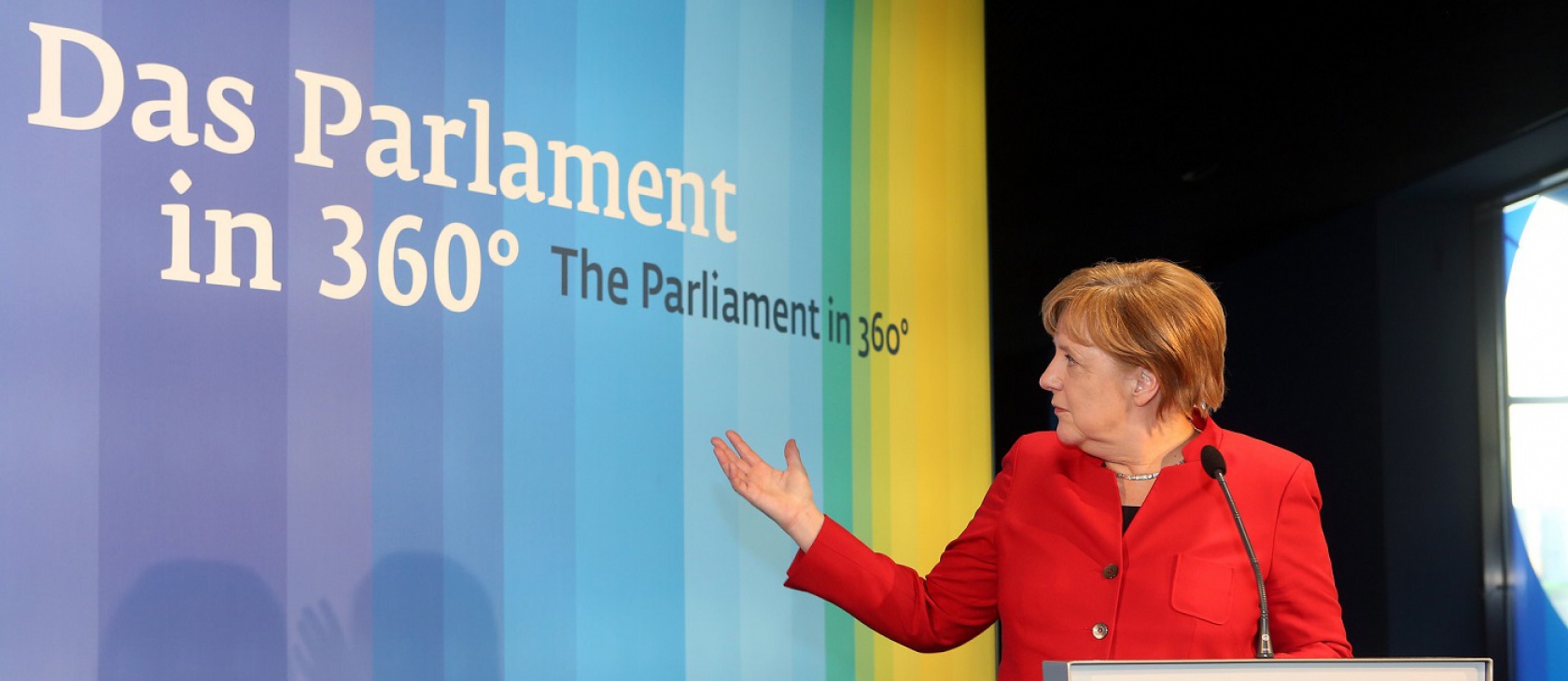From the foundation of the Federal Republic of Germany in 1949, Christian Democracy has served as something near the permanent majority political movement, and the Christian Democratic Union (Christlich Demokratische Union, CDU) something near the permanent majority party (47 out of 69 years). Conceived by the devout Catholic lawyer and first postwar chancellor Dr. Konrad Adenauer, its purpose was to unite all the believing and practicing Christians of Germany within a new democratic regime, abjuring both the Nazi past and the Communist alternative. Its distinctive doctrine of the “social market economy” (soziale Marktwirtschaft) encourages free enterprise and permits capitalism to operate within the ethical framework of democratic Catholicism; and this approach indisputably contributed to the economic resurrection of Germany during the 1950s under economics minister Dr. Ludwig Erhard. The adherence of West Germany to the democratic world, the reunification of Germany after the Cold War, and finally the entry of the Federal Republic into a federal Europe in the new century were all also achieved under Christian Democratic leadership. Yet in the inconclusive general elections of September 24, the CDU suffered a serious crisis of public confidence, securing only 27 percent of the vote and (246 of 709 seats) and forcing CDU head and German Chancellor Dr. Angela Merkel to engage in intermittent bouts of tedious conference talks with potential coalition partners, discussions which continue with the SPD discussed below at the time of this writing. As most English-language coverage of continental European parties tends to be rather superficial, it would be useful to furnish additional details as to the other German political parties, at least one of which must soon join ranks with the Christians in order to form a new majority in the Bundestag and, hence, a federal government.
In second place came the Social Democratic Party (Sozialdemokratische Partei [SPD], 153 seats), which, like the CDU, began its history commensurate with the foundation of the republic. The SPD is the “established” socialist party of Germany, which – along with socialist comrades in France, Spain, and elsewhere – holds that the nationalization of the primary means of production will somehow result in sufficient public funds to satisfy every basic human need, and once those needs are met, true democracy will somehow follow. “The German Social Democratic Party,” its current platform (Oct., 2007) states, “fought for workers’ rights, developed the social welfare state, and together with the trade unions it enabled disdained proletarians to become self-confident state citizens with equal rights” (7). In accordance with the Marxist conception of history, the SPD holds that the working classes shall serve as the messianic harbinger of a more just world order; and it, therefore, advocates workers’ rights, the welfare state, such “free” public goods as education and medicine, and resistance to any imperialist tendencies. Notable SPD chancellors include Willy Brandt (1969-74), who pursued rapprochement with the Communist Eastern-bloc, and Helmut Schmidt (1976-82), who defeated the Red Army Faction, a murderous student left insurgency.
All eyes are however fixed upon Alternative for Germany (Alternative für Deutschland [AfD, 2013-present], 92 seats), which enters parliament for the first time. Led to victory by Saxon chemist Dr. Frauke Petry, the Alternatives concluded a party program at Stuttgart in May, 2016 that reads primarily as a Lockean, liberal constitutionalist manifesto onto which a sustained polemic against the Islamic religion is grafted. “The guiding principle of our program,” AfD states, “is the fundamental conviction that the German people themselves, wherever possible, should be able to determine the run of political events” (1.2). Citing as inspiration the German revolutions of 1848 and 1989, much of the popular if not elite appeal of the AfD assuredly derives from its bold and innovative positions on several questions of public concern that the other parties refuse to acknowledge. First, the AfD seeks to introduce popular referenda based on those of the neighboring Swiss Confederation, a proposal that may make for a rousing beer hall address but would in reality be tantamount to a new constitution. Second, Germany must leave the European Monetary Union and no longer serve as the indulgent creditor for Greece or for any other euro-area nation overwhelmed by sovereign debt. Third, the new party “firmly opposes Islamic practice which is directed against our liberal-democratic constitutional order, our laws, and the Judeo-Christian and humanist foundations of our culture” (7.6). This opposition to the imported German and European Islam is to be enforced through prohibition on the foreign financing of mosques, of the construction of minarets, of the opening of fresh madrassas, and of the wearing of the burqa/niqab in public and of the hijab in the schools. The AfD likewise insists that German law rigorously distinguish between genuine refugees (Flüchtlingen) and “irregular migrants” (irregulären Migranten), the latter of whom are to be invariably sent back. Thus if the Western democracies—through such phenomena as Brexit or Trump—may as a whole be said to evince revolutionary political forms, then Alternative for Germany certainly belongs to that revolution.
The Free Democrats (Freie Demokraten [FDP, 1948-present], 80 seats), meanwhile, were returned to the Bundestag after an humiliating four year exile. In a remarkably apolitical 2017 manifesto, the Free Democrats, as if contracted to run a state audit, survey a litany of public sectors requiring more funding, reduced inefficiency, and/or active transformation, including transportation, housing, information technology, patent laws, pension systems, and waste disposal. The most sustained emphasis, however, concerns digitization (Digitalisierung) which is to serve as the primary catalyst for “greater prosperity, self-employment, more meaningful work, and a less complicated state” (18). The Free Democrats—at least under their current leader, Christian Lindner—reveal themselves as technocrats, those who believe that technological progress can supply the deficiencies of parliaments and politicians. A highly prominent social theory during the mid-twentieth century, technocratic philosophy is at least partially responsible for developments as seemingly far removed as the Tennessee Valley Authority, the British National Health Service, or the European Coal and Steel Community, with authors such as David Mitrany or Joseph Schumpeter attempting to baptize the new benign materialist order. The Free Democrats, whose views on foreign relations are similarly functionalist, are thus like the two leftist parties identified and discussed below attempting to apply a particular international theory to a particular, in this instance German case.
Next is The Left (Die Linke [2007-present], 69 seats). Diametrically opposed to international capital and to the imperial domination it purportedly creates, the revolutionary discourses of The Left are instantly recognizable to any long-haired disciple of Herbert Marcuse. “Capitalism is not the end of history but a stage in human development which…brought mass impoverishment, genocide and unimaginable wars over humanity” (27). “Die Linke stands in fundamental social and political opposition to neo-liberalism and the rule of capital, imperialist policy and war” (74). Perpetuating the bygone struggles of Rudi Dutschke and the student opposition, the party program of the The Left seeks an end to all neo-liberal policies, uncompromising pacifism and disarmament, decommissioning of nuclear power, and proletarian liberation to the end of forging a radically new society. Interestingly, there is little to nothing that reflects actual conditions in contemporary Germany: The Left manifesto could just as easily have been composed at Berkeley in 1968 as at Erfurt in 2011, reflecting a serious deficiency of original thinking.
In last place finished Alliance 90/The Greens (Bündnis 90/Die Grünen [1993-present], 67 seats). “The Future is Green,” its undated English-language manifesto, is best described as Kantian, emphasizing the attainment of individual rights within a strongly multilateral framework of global governance. “We combine ecology, self-determination, expanded equitability and a vibrant democracy,” they state. “With the same intensity, we are committed to non-violence and human rights” (7). Whereas The Left, described above, postulates an essential, reciprocal connection between socialism and democracy, Alliance 90/The Greens argues that ecology and democracy are the self-reinforcing halves of the social whole; and therefore preservation of human and natural ecology must become the central cause of government. This sustainable world is to be achieved through scrupulous adherence to international law overseen by an ever-strengthened United Nations system.
In short, current German politics furnishes a highly eclectic dramatis personæ, all of whom have taken a toll upon its Christian Democratic leadership. They all exert less popular appeal than the CDU, but that must serve as no excuse for apathy and contentment. The operative liturgical phrase, after all, is Church militant.




